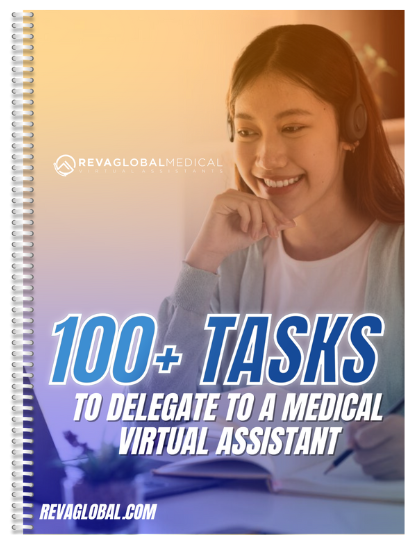Top 10 Must-Have Skills Every Medical Virtual Assistant Needs to Succeed

In today’s fast-paced healthcare industry, Medical Virtual Assistants (MVAs) have become invaluable assets to private practices, clinics, and healthcare organizations.
These remote professionals help reduce the administrative burden on medical staff, allowing providers to focus more on patient care. But what exactly makes an effective Medical Virtual Assistant? What skills and qualifications are essential to thrive in this role?
In this blog, we’ll explore the core competencies, technical proficiencies, and educational backgrounds that contribute to a successful career as a Medical Virtual Assistant.
1. Strong Communication Skills
Clear and effective communication is at the heart of any healthcare role, and MVAs are no exception. Since they operate remotely, it’s vital that MVAs can communicate fluently and professionally in both written and verbal formats. They often interact with patients, medical staff, insurance companies, and other stakeholders via phone, email, and chat.
Key competencies include:
- Excellent grammar and spelling
- Active listening and patient empathy
- Clarity in conveying complex information
- Professional telephone and email etiquette
2. Knowledge of Medical Terminology
A Medical Virtual Assistant must be fluent in the language of healthcare. Familiarity with medical terminology, abbreviations, and standard documentation practices allows MVAs to perform their tasks with accuracy and professionalism.
Why it matters:
- Ensures accurate patient documentation
- Helps avoid errors in transcription and record keeping
- Facilitates better communication with healthcare providers
3. Administrative and Organizational Skills
MVAs typically handle a wide range of administrative duties such as scheduling appointments, managing calendars, handling patient intake, and processing insurance claims. This requires strong organizational skills and the ability to multitask efficiently.
Essential capabilities include:
- Calendar and inbox management
- Data entry and database management
- Time management and task prioritization
- Appointment scheduling systems proficiency (e.g., Kareo, SimplePractice)
4. Proficiency in Electronic Health Records (EHR) Systems
Understanding how to navigate and utilize Electronic Health Record systems is a crucial part of an MVA’s daily responsibilities. Whether inputting patient notes or retrieving files, proficiency in EHR systems boosts efficiency and reduces room for error.
Popular platforms MVAs often use:
-
Athenahealth
-
Epic
-
Kareo
-
Practice Fusion
-
AdvancedMD
5. HIPAA Compliance and Data Security Awareness
Medical Virtual Assistants are frequently exposed to sensitive patient information. Therefore, having a solid understanding of HIPAA regulations and how to securely handle patient data is non-negotiable.
MVAs should be trained in:
-
Confidential patient data handling
-
Secure file sharing platforms
-
Password and system security protocols
-
HIPAA-compliant communication tools
6. Tech-Savviness and Adaptability
As remote professionals, MVAs rely heavily on technology to execute their roles. They must be comfortable using various platforms, tools, and software to support healthcare operations.
Examples of key tools:
-
Telehealth software (e.g., Zoom Health, Doxy.me)
-
Project management tools (e.g., Trello, Asana)
-
Cloud storage solutions (e.g., Google Drive, Dropbox)
Additionally, being adaptable to new technologies and quick to learn unfamiliar systems is a big plus.
7. Medical Billing and Insurance Verification Skills
Many practices utilize MVAs to support revenue cycle management tasks. Having experience in medical billing and insurance verification processes ensures that claims are processed accurately and payments are received on time.
Relevant skills include:
-
Understanding of CPT and ICD-10 coding
-
Familiarity with insurance portals
-
Patient eligibility checks
-
Claims processing and follow-up
8. Customer Service Orientation
In many cases, the MVA is the first point of contact a patient has with a practice. Having a warm, empathetic demeanor and strong customer service skills can go a long way in improving the patient experience.
What this looks like:
-
Friendly and professional communication
-
Prompt response to inquiries
-
Ability to de-escalate tense situations
-
Understanding patient needs and concerns
Streamline your practice with a Medical Virtual Assistant
By utilizing a Medical Virtual Assistant, you can free up your time and ensure that your medical practice operates efficiently
8. Customer Service Orientation
In many cases, the MVA is the first point of contact a patient has with a practice. Having a warm, empathetic demeanor and strong customer service skills can go a long way in improving the patient experience.
What this looks like:
-
Friendly and professional communication
-
Prompt response to inquiries
-
Ability to de-escalate tense situations
-
Understanding patient needs and concerns
9. Medical Transcription and Documentation
For providers needing help with documentation, MVAs skilled in transcription can make a significant impact. Transcribing notes from voice recordings or video calls allows clinicians to maintain accurate patient records without sacrificing time.
Benefits of transcription skills:
-
Faster turnaround on clinical documentation
-
Reduced provider burnout
-
More comprehensive patient notes
10. Educational Background and Certifications
While not always mandatory, having a background in healthcare or administrative services can give candidates an edge. Many MVAs hold degrees or certificates in:
-
Medical Assisting
-
Health Information Management
-
Medical Coding and Billing
-
Nursing or Pre-Nursing Studies
In addition, completing training programs specific to virtual assistant work or healthcare administration is often preferred by hiring practices.
The demand for Medical Virtual Assistants continues to grow as more healthcare providers seek cost-effective and efficient ways to manage administrative workloads. By building a foundation of strong communication, tech proficiency, and healthcare knowledge, MVAs can offer high-value support to medical practices of all sizes.
For those considering this career path, investing in the right skills and certifications can open the door to meaningful and rewarding opportunities in the healthcare industry.
Interested in hiring a pre-trained Medical Virtual Assistant? Reach out to our team at Global Medical Virtual Assistants to learn how our MVAs can streamline your operations and enhance patient care.
Schedule Your Strategy Session!
Grow Your Brand With Trained Virtual Assistants
Get the help you need to take your brand and business to the next level.
Not Sure What Tasks To
Start Outsourcing?
We’ve got you covered.
Download our free guide to help you get started.


